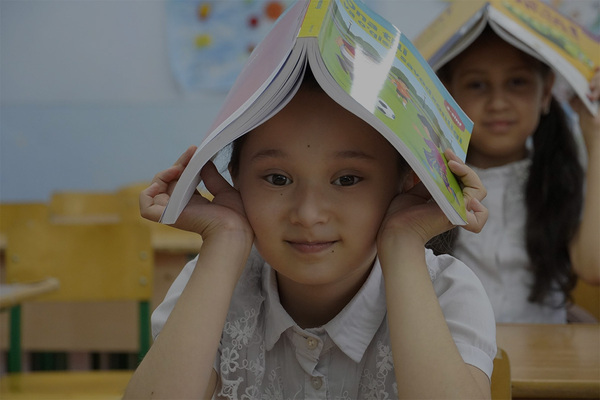Increasing supportive environments for students with disabilities — with policies in place addressing issues such as accessible infrastructure, specialized support services, and adapted teaching methods — is a priority for the Uzbekistan government, parents, and teachers. Inclusive education allows students of all backgrounds to learn side by side and is valuable from educational, social, economic, and rights-based perspectives. But progress tends to come slowly.
Two years after reforms passed, the Uzbek regime needed a road map to strengthen disability-inclusive education. In October 2022, researchers from the Pulte Institute for Global Development, working as part of the USAID-funded SHARE cooperative agreement in collaboration with Uzbek integration experts, conducted a ‘rapid systems’ diagnostic study to assess the status and quality of education for children with disabilities.
 The Pulte Institute conducted a ‘rapid systems’ diagnostic study in Uzbekistan to inform, in a timely manner, the design of new support programs to improve the quality of instruction for children with disabilities — and to proactively guide the process of developing inclusive and accessible classrooms and teaching styles to further engage students and better meet their needs.
The Pulte Institute conducted a ‘rapid systems’ diagnostic study in Uzbekistan to inform, in a timely manner, the design of new support programs to improve the quality of instruction for children with disabilities — and to proactively guide the process of developing inclusive and accessible classrooms and teaching styles to further engage students and better meet their needs.Pulte Institute researchers visited three cities — Tashkent, Syrdarya, and Namangan — and built and applied a Universal Design for Learning framework, an educational tool to uncover barriers to providing all students equal opportunities. The framework assessed the existing system, identifying root causes and potential leverage points to spark policy dialogues and advise the Uzbek government on priorities for reforms.
The Pulte Institute’s approach allowed for the scope and depth of activities to be tailored according to the communities’ needs, resources, and time available, and its UDL framework provided an evidence-based analysis of the critical issues and challenges of each city’s education sector.
Following a series of high-level meetings between government ministries and educational and community partners in October 2020, Uzbekistan’s President Shavkat Mirziyoyev introduced an 'Action Plan for the Development of an Open Education System for Children with Special Needs.' In 2021, the Uzbek government passed a resolution (no. 638) on inclusive schools that codified a five-year plan to include
'[The Pulte Institute] built and applied a Universal Design for Learning framework, an educational tool to uncover barriers to providing all students equal opportunities. The framework assessed the existing system, identifying root causes and potential leverage points to spark policy dialogues and advise the Uzbek government on priorities for [education] reforms.'
Then, in September 2022, 225 public schools nationwide opened their doors to children with disabilities. However, in too many cases, children with disabilities still experienced exclusion, where, often unintentionally, they were denied access to educational opportunities because the disabled students needed to adapt to existing systems.
Uzbekistan traditionally has taken a segregation approach, with disabled children educated in separate schools and isolated from their peers. The reasoning was that children with disabilities would benefit from specialized resources and support for their impairments and needs.
Today, the international education community broadly views segregation as tantamount to discrimination that fails to recognize students’ individual abilities and circumstances. When President Mirziyoyev's ‘Action Plan’ was issued in 2020, UNICEF estimated that roughly 75 percent of children with disabilities were attending ‘special schools,’ and 9,700 children with disabilities were out of the school system altogether.
The segregation of students with disabilities has a long history in Uzbekistan, and the effects linger. While the ‘Action Plan’ and Res. 638 represent important victories, they aren't a cure-all. Some school officials and parents still argue that children with disabilities need to be kept apart from their peers.
'Evidence-based practices lead to better policies, better use of taxpayer dollars, and better outcomes for children and families. To that end, the Pulte Institute’s assessment of the quality of instruction for children with disabilities inspired the USAID Mission in Uzbekistan to launch a new $25 million project on inclusive education — to break down the socio-political construct and to help remove attitudinal, environmental, and institutional barriers.'
Educational inclusion entails a whole-scale transformation of school systems, cultures, and practices to accommodate a wider range of students' needs, recognizing that everyone — regardless of ability — can learn and grow through educational opportunities. Meeting targets for inclusive education and implementing enacted policies requires significant capacity, financial investment, and social change.
The Pulte Institute's assessment combined data and qualitative evidence to determine priority areas for support, including increasing collaboration among educators and specialists, facilitating effective communication and relationships between parents, teachers, and government officials, and ensuring adequate resource allocation for inclusive policies.
 Children in the street in Old Town Khiva, Uzbekistan
Children in the street in Old Town Khiva, Uzbekistan Pulte Institute researchers recommend that Uzbek government officials build capabilities across three critical areas in particular: weak relationships and poor communications, capacity gaps among key stakeholders, and concerns over resource allocation.
They also suggest a strategic focus on policies and plans, training for teachers and staff, tiered support levels, targeted instructional approaches, and holistic partnerships for related services.
The findings underscore the need for a systemic overhaul to foster quality education for children with disabilities and to help disabled students and their families become part of their school communities and, by extension, society as a whole. The purpose of the ‘rapid systems’ diagnostic study was — and continues to be — to inform the design of new support programs. Over time, the Pulte Institute is expected to play a greater role in helping to structure and inform education policy in this Central Asian country.
Evidence-based practices lead to better policies, better use of taxpayer dollars, and better outcomes for children and families. To that end, the Pulte Institute’s assessment of the quality of instruction for children with disabilities inspired the USAID Mission in Uzbekistan to launch a new $25 million project on inclusive education — to break down the socio-political construct and to help remove attitudinal, environmental, and institutional barriers.
“The methods we use,” says Principal Investigator TJ D’Agostino, “can be applied to rapidly diagnose the needs of education networks globally.”